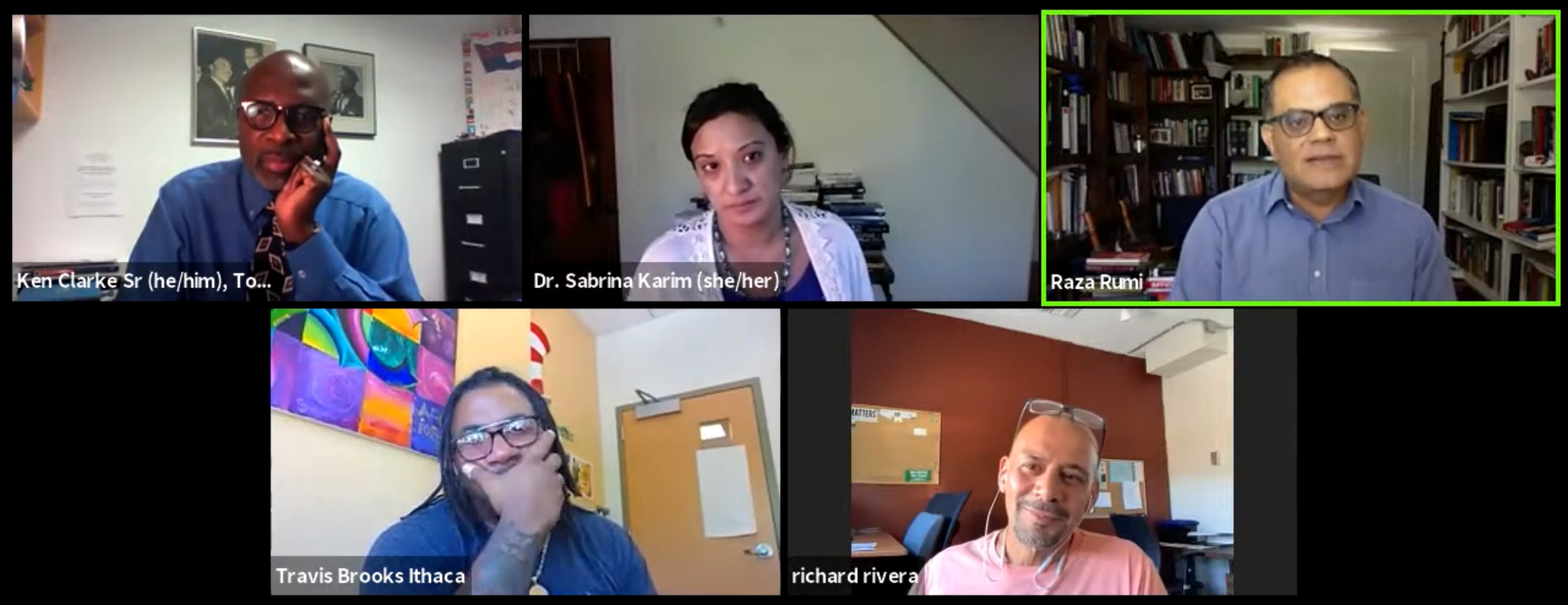As part of an ongoing virtual panel series on critical local issues, the Tompkins County office of Human Rights hosted a panel of academics and local professionals to discuss violence in Ithaca and America. Dr. Ken Clarke, Director of the Office moderated the discussion and introduced the context of reported local and national upticks in violence and crime. Dr. Clarke invited the panelists to discuss how violence and crime are experienced, reported on, and discussed.
Dr. Sabrina Karim, Assistant Professor in Government at Cornell University introduced frameworks to assess why we see violence in general, sharing that “if we take a step back to understand criminal violence we’d see much of it as structural violence – meaning systemic ways that social structures harm individuals, sometimes in subtle ways.” Karim highlighted the examples of racism, elitism, ethnocentrism, adding, “when you think of these it’s easy to see the connection to violence and lack of opportunity leading to lack of access and adverse health outcomes … these can ripple out to criminal violence. Policies that we enact have downstream consequences.” Karim noted that “Crime rates dominate the media right now, but we need to step back and look at structural and political violence, because it is all related.”
Community Organizer Richard Rivera added that “in America, violence is racialized – when we talk about it in reduced terms (i.e., “inner-city, gangs, naming certain cities”) it focuses on crime committed by Black youth. The perception of Black and brown boys being more mature and violent influences our wider perception on violence.” Rivera echoed Dr. Karim’s comments, noting, “this violence doesn’t come out of nowhere.” He continued by explaining that many of the community’s perceived upticks in violence are generally related to “the same few individuals acting out, committing a few crimes a day and greatly increasing crime statistics,” adding, “when we see these upticks in crime, whole communities are painted as bad.”
Panelists agreed with the perspective shared by Rivera, that “we can start by listening to these individuals and finding out why they’re acting out to address these issues.” Highlighting the racialized nature of violence he cited earlier, Rivera reminded panelists and the community that “[Ithaca’s] population is 4% Black, yet they consistently make up 40-50% of the local jail population.”
Professor Raza Rumi Ahmad, who serves as the Director of the Park Center for Independent Media at Ithaca College, spoke to a national context of how violence is perceived and reported on. Prof. Rumi leveled a critique of corporate and mainstream media outlets, sharing that they tend to “default to evading law enforcement accountability. We see media describe violence as ‘aggressive tactics’ and ‘clashes.’” He continued by underlining that media frequently uses the passive voice when it comes to policing and political violence, using the example that there have been nearly 300 mass shootings in the United States this year, and that while media gives attention to these atrocities, they “often tiptoe around racism in shootings where people of color are often targeted by white assailants.”
Rumi added further stated, “the coverage is so lopsided that it often does not educate and inform the public on the real crisis gun violence imposes,” and cited a recent study of 22 shooters that showed mass shooters often have a history of domestic abuse, stalking, and harassment. “These interlinkages play out in abuse and misogyny, and mainstream media plays a minimal role informing what type of threat this poses.” Rumi subsequently asserted that “it is now an official position that white supremacists and other domestic violent extremists pose the most persistent and lethal threat to the United States. Gun culture, structural racism and domestic abuse are interlinked in driving violence.”
Dr. Karim added her perspective on the media framing of “’random acts of violence,’” saying, “one of the best explanations I’ve heard is that we haven’t as a society been able to grieve about the last year with over 600,000 people dying. That’s going to have some kind of impact, potentially some of that is violence. It could be really harmful to just move on from the past year.” Panel moderator Dr. Ken Clarke added that “when people are fatigued, that exacts certain costs from us. I’m reminded of the need to step back in order to step back in… we may need to retreat in order to replenish.”
Offering one solution to the framing of violence, Rumi shared that “We have to look at context. The context can determine how we can make approaches to undermine the violence we do see and address who the actors are and are not.” He continued, “Narratives are important, perception shapes reality.” Panelist and Deputy Director of the Greater Ithaca Activities Center, Travis Brooks shared that part of his work is “reframing what healthy masculinity looks like – a lot of work around this is directly related to reducing violence against women.”
When asked about how trauma at the individual level contributes to occurrences of violence, Richard Rivera shared that he has “not met anyone in local [homeless] encampments or suffering from substance abuse that has not experienced trauma.” Dr. Karim added, “This is an area where there’s been a lot of research … with people who are victims of political violence – the standard assumption is that violence begets more violence, but in fact that is not true, people who experience violence often become more politically active and pro-social.” Travis Brooks explained that in his work he’s uncovered much about how our mental health system is broken, “young folks need services they don’t get. Trauma plays a huge role in violence.”
Watch the full panel discussion here:

